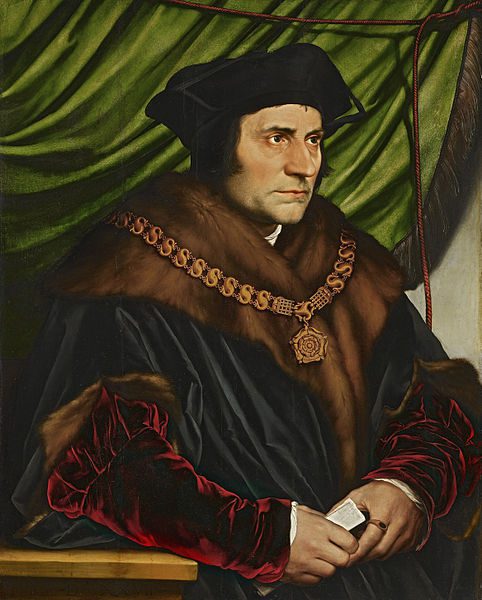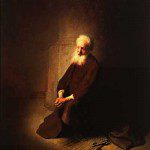Thomas More by Hans Holbein
“There can be seasonal misrule only within a prevailing architecture of order…Debates and disputations…are possible only within the context of an assured and absolute truth which governs humankind.”
– Peter Ackroyd, author of The Life of Thomas More
He loved his Church. He loved the Law. He loved his King.
Of course he did.
And yet ultimately, Thomas More would have to choose.
The Church, in More’s time, stretched back 1500 years. Its traditions, its sacraments and its tender mercies had nursed and molded his character. For several years, the young Thomas More discerned a vocation as a Carthusian priest spending hours in prayer and fasting in the Charterhouse of London. For many reasons he would choose the law over the priesthood, most notably because he lacked the call to celibacy and feared he would be an “unchaste priest”. And so he would become a devoted husband, a doting father, an honest jurist and a good man. Faith epitomized Thomas More.
The Law was the edifice of English society. It was, effectively, Right Reason codified. And Right Reason codified was man’s faintest apprehension of God’s Eternal Law. As a lawyer, judge and (ultimately) Lord Chancellor, Thomas More saw the faithful application of the law as a sacred duty. While ultimate justice resided in the hands of God, temporal justice could be earnestly, if imperfectly, enacted. But in order for the temporal to do honor to the eternal, man’s law had to draw from the deep wells of tradition and morality. Caprice and selfish appetite had no place in the formation or application of law. The Law defined Thomas More.
The King represented an honored tradition of structure and order. The simple matter of marriage and childbirth could promise magnificent dynasties or tragic collapse. And the character of the King (or Queen) could enhance trade, grow culture and win wars, or it could lead a nation to its ruin. King Henry VIII was intent on the former. And to do this, he depended on his friend and confidant, Lord Chancellor Thomas More.
More was devoted to the Church, the Law and the King.
But what would happened if they were at odds?
Inevitably, they would be.
King Henry VIII sought to change the Law. He sought to alter the Law which was rooted in Scripture and Church Tradition. And he did it to serve his own appetite. Married to Queen Catherine of Aragon, the lusting King’s sought annulment of his marriage in order to marry the young Anne Boleyn. In short order, the Pope denied his request which, in turn, led to a draconian split between King Henry VIII and the Catholic Church. Declaring himself Supreme Head of the Church of England, the King altered doctrine according to his own will, expropriated Church properties and demanded faithful utterance of the Oath of Supremacy and the Oath of Succession. These Oaths renounced allegiance to the Pope and acknowledged the royal bloodline passing through the new Queen Anne Boleyn.
And the King wanted Thomas More to swear to it.
But this caprice was unconscionable to Thomas More. The Church is the custodian of God’s Word on Earth. The Law is man’s steady, enduring conception of God’s Will (understood through reason) enshrined in statute and precedent. The Church and the Law were not to be trifled with. And yet the brazen King would do just that. He not only trifled with them…he upended them.
And so, Thomas More had a choice. The Church and the True Law or the King and his law.
Peter Ackroyd, author of The Life of Thomas More, articulated More’s worldview,
“Religion and law were not to be considered separately; they implied one another. That is why law was to be considered to be perfect in itself, undamaged by the bad judgments of individual practitioners; the same argument, on the merits of the Mass as opposed to the virtue of the priest who offered it, was at the heart of Catholic eucharistic belief. That is why the law was considered to be permanent; it was what was known to be true, withstanding change or decay.”
Thomas More found an illegitimacy in the judgment of King Henry VIII even while he hoped to maintain him as his friend. More perceived a spuriousness in Parliament’s attempt to “legally” uphold the King’s illegitimate judgment. And he found enduring truth in the Church’s respect for the institution of marriage even though the Pope could get ensnared in political sniping and maneuvering. Ackroyd offers this brilliant assessment,
“It is misleading to separate ‘social’ from ‘political’, ‘legal’, or ‘religious’ matters in this period.; they represent the same central concern of fallen man, which lay in understanding and organizing his temporary sojourn on earth.”
Thomas More always knew who and what he served first – His God & Church. He would routinely attend Mass at a small local church and it was not uncommon that the esteemed Lord Chancellor, would serve in the humble role of altar boy or choir member. Chastised by his friend the Duke of Norfolk for stooping to such a lowly role, More twinkled,
“My master the King cannot be displeased at the service I pay to his master God.”
Thomas More greatly respected the Law, but knew the illegitimacy of Parliament to enact law declaring a spiritual truth (the King named Supreme Head of the Church of England). By refusing to take the Oath of Supremacy, he was forced into the dreary Tower of London for fifteen months. He was deprived of basic food, warm clothing, access to family and personal items. While there, he always knew who and what he served first. More, cold, shivering and alone prayed,
Give me the grace, Good Lord
To set the world at naught. To set the mind firmly on You and not to hang upon the words of men’s mouths.To be content to be solitary. Not to long for worldly pleasures. Little by little utterly to cast off the world and rid my mind of all its business.
Not to long to hear of earthly things, but that the hearing of worldly fancies may be displeasing to me.
Gladly to be thinking of God, piteously to call for His help. To lean into the comfort of God. Busily to labor to love Him…
…………..
To think my worst enemies my best friends, for the brethren of Joseph could never have done him so much good with their love and favor as they did him with their malice and hatred.
These minds are more to be desired of every man than all the treasures of all the princes and kings, Christian and heathen, were it gathered and laid together all in one heap.
Amen
And when on trial, More opted to be silent instead of affirming the Parliament’s illegitimate law. He opted not to grovel for mercy before his capricious King. And he went to his execution affirming what he believed,
“I die the King’s good servant, but God’s first.”
Yes, yes.
Perhaps, in a season of politics and muddled loyalties, we would do well to remember:
Thomas More loved his King, loved the Law and loved his life. He was truly a good servant.
Truly.
But God’s first.
————————————————
Photo courtesy of Wikimedia Commons
















